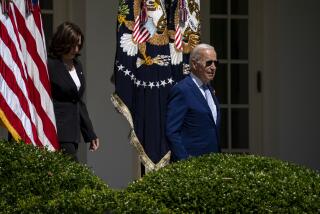House Approaches Youth Crime Bill, Firearms Debate With 150 Positions
- Share via
WASHINGTON — The contours of a freewheeling House debate on gun laws began to emerge Friday as Republicans and Democrats offered more than 150 proposals for new firearms restrictions and other measures aimed at curbing youth violence.
The flood of proposed amendments to a juvenile crime bill reflects the keen awareness of House members that the public is watching their response to the recent spate of school shootings.
It also speaks to uncertainty about the gun legislation in the wake of a decision by House Speaker J. Dennis Hastert (R-Ill.) to forgo any attempt to impose a party line when the issue comes up for debate in the House next week.
The number of amendments will be pared down by the Rules Committee in a hearing to start Monday. But that will not be an easy task, Rep. David Dreier (R-San Dimas), the panel’s chairman, acknowledged Friday. Dreier said that the proposals “cover the whole gamut” of positions on an ideologically charged issue.
“It is very complex,” said Dreier, who favors a package of new firearms restrictions similar, though not identical, to what the Senate passed last month. “It’s an issue that is tough for a lot of people. Virtually everyone has strong feelings on this.”
Rep. Christopher Cox (R-Newport Beach), who favors limiting the federal role in gun regulation, described the overall status of the firearm legislation as “quite fluid.”
Three Likely House Scenarios
According to several congressional sources, it remained impossible to predict how the House debate will play out. The three likely scenarios:
* Do nothing, or next to nothing, to change the nation’s gun laws. This is the tack of a sizable number of gun-rights advocates, mostly Republicans, who want to shift the focus of the debate spurred by the April high school massacre in Littleton, Colo., to other arenas, such as the violent content in movies, video games and compact discs, or a breakdown of family values.
* Pass the Senate’s package. Among its provisions are mandatory criminal background checks on all firearms transactions at gun shows (currently, such checks are only required when sales are made by federally licensed dealers), a ban on the import of high-capacity ammunition clips and a requirement for safety locks to be sold with handguns. This is what the House Democratic leadership--as well as some Republicans--want at a minimum.
* Pass an altered version of the the Senate package, a plan being pushed by Rep. Henry J. Hyde (R-Ill.), chairman of the House Judiciary Committee.
Hyde’s proposals have been attacked by many House Democrats, including the party’s leaders, as loophole-ridden efforts to do the bidding of the National Rifle Assn. One widely cited example: a Hyde provision to exempt firearm sales from criminal background checks if there are fewer than 10 gun vendors gathered at a show or flea market. The Senate measure defines a gun show generally as any public event in which 50 or more guns are for sale, even if all are being offered by one vendor.
Predicting Vote Patterns Difficult
At this point, congressional aides said, predicting the voting patterns of the 435 representatives is difficult. For one thing, the Republicans hold a precarious majority of 223 seats. The Democrats hold 211 and there is one Democrat-leaning independent. For another, the gun issue also divides along regional lines. Those who represent urban centers, regardless of party affiliation, are more likely than their rural counterparts to favor gun control.
A spokeswoman for House Minority Leader Richard A. Gephardt (D-Mo.) predicted that 30 to 40 Democrats who support gun rights could oppose an effort to pass the Senate package.
But a spokeswoman for House Majority Leader Dick Armey (R-Texas) said that a couple of dozen Republicans could stray from Hyde’s side and push for the Senate legislation.
Even these rough estimates could fluctuate in days to come as lobbying pressure increases from the NRA and from gun-control advocates. Votes are expected starting Wednesday.
Also potentially affecting the outcome is the sequence of the votes. Armey’s spokeswoman, Michele Davis, said that various firearms restrictions are likely to be voted on piecemeal, rather than as a package. Depending on how the votes evolve, advocates of gun control could be forced into some hard choices.
For instance, Rep. Ellen O. Tauscher (D-Pleasanton), a second-term representative who captured a suburban Bay Area district from a Republican incumbent in 1996, in part by campaigning for gun control, said that she will support the package the Senate passed. But, Tauscher said, if she is given a choice of passing a weakened version of the Senate package or passing nothing at all she would vote for the former.
“I want to move the ball forward, whether that’s inches or whether we get the score,” Tauscher said. “Ultimately, my job is to get things done.”
More to Read
Get the L.A. Times Politics newsletter
Deeply reported insights into legislation, politics and policy from Sacramento, Washington and beyond. In your inbox twice per week.
You may occasionally receive promotional content from the Los Angeles Times.










